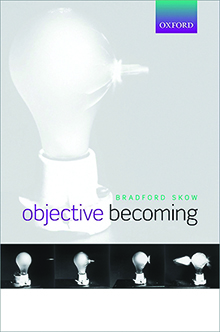“If you walk into a cocktail party and say ‘I don’t believe that time passes,’ everyone’s going to think you’re completely insane,” says Brad Skow, an associate professor of philosophy at MIT.

By Bradford Skow, associate professor
of philosophy
Oxford University Press, 2015, $60
He would know. Skow himself doesn’t believe time passes, at least not in the way we often describe it. “When you ask people, ‘Tell me about the passage of time,’ they usually make a metaphor,” he says. “They say time flows like a river, or we move through time like a ship sailing through the sea.”
But Skow thinks time is never in motion quite as we imagine it is. He believes that time should be regarded as what the theory of relativity says it is: one of the dimensions of spacetime. Time is part of the uniform larger fabric of the universe, not something moving inside it. In Objective Becoming, a new book published by Oxford University Press, he details this view, which philosophers call the “block universe” theory of time.
When Skow says time does not pass, he’s not saying that nothing ever happens. Many events occur: people are born, they die, they age, and so forth. “Things change,” he agrees.
But events do not sail past us in time and vanish forever, he says; they simply exist in different parts of spacetime. We exist in a “temporally scattered” condition, Skow writes. “The block universe theory says you’re spread out in time, something like the way you’re spread out in space,” he adds, discussing the theory in his office.
Skow knows this can seem counterintuitive, and in the book he examines alternative theories of time. One idea, the “moving spotlight” theory, holds that only one moment is absolutely present, and the present moment keeps changing, as if a spotlight were moving over it. That is also consistent with relativity, he acknowledges, but it treats the present as being too distinct, as if it were cut from a different cloth than the rest of the universal fabric.
On one level, our view of time won’t change anything about how we live our lives, but Skow thinks it’s important because we are always saying time passes and never really thinking through what we mean by that. “I was interested in seeing what kind of view of the universe you would have if you took these metaphors about the passage of time very, very seriously,” he says.
Skow’s own past includes growing up in San Luis Obispo, a town in central California. He attended college at Oberlin, where as an English major he took a philosophy course and encountered a professor, Daniel Merrill, “who told me I was good at philosophy.” He emerged from college as a double major and then got a PhD from New York University.
Skow, who received tenure at MIT last year, teaches a wide variety of classes in the philosophy of science, ranging from relativity to quantum mechanics and beyond. “I think it’s as important for philosophers to know some physics as it is for them to know some [formal] logic,” he says. “Maybe more important.”
Recent Books From the MIT Community
Fail Better: Design Smart Mistakes and Succeed Sooner
By Anjali Sastry ’86, PhD ’95, senior lecturer, Sloan School of Management, and Kara Penn
Harvard Business Press, 2014, $30
Reading the Comments: Likers, Haters, and Manipulators at the Bottom of the Web
By Joseph M. Reagle Jr., SM ’96
MIT Press, 2015, $27.95
Cybersecurity for Executives: A Practical Guide
By Gregory J. Touhill and C. Joseph Touhill, SM ’61
John Wiley and Sons, 2014, $89.95
Dream Chasers: Immigration and the American Backlash
By John Tirman, executive director, Center for International Studies
MIT Press, 2015, $27.95
Strategic Relationships at Work: Creating Your Circle of Mentors, Sponsors, and Peers for Success in Business and Life
By Kathy Kram ’72, SM ’73
McGraw-Hill, 2014, $26
Hidden History of Maynard
By David Mark, PhD ’73
The HIstory Press, 2014, $19.99
First to File: Patents for Today’s Scientist and Engineer
By M. Henry Heines ’67
John Wiley and Sons, 2014, $89.95
Architecting the Future Enterprise
By Deborah J. Nightingale, research affiliate, School of Engineering, and Donna H. Rhodes, principal research scientist, Sociotechnical Systems Research Center
MIT Press, 2015, $29.95
Please submit titles of books and papers published in 2014 and 2015 to be considered for this column.
Contact MIT News
E-mail: mitnews@technologyreview.com
Write: MIT News, One Main Street,13th Floor, Cambridge, MA 02142
Keep Reading
Most Popular
Large language models can do jaw-dropping things. But nobody knows exactly why.
And that's a problem. Figuring it out is one of the biggest scientific puzzles of our time and a crucial step towards controlling more powerful future models.
How scientists traced a mysterious covid case back to six toilets
When wastewater surveillance turns into a hunt for a single infected individual, the ethics get tricky.
The problem with plug-in hybrids? Their drivers.
Plug-in hybrids are often sold as a transition to EVs, but new data from Europe shows we’re still underestimating the emissions they produce.
Stay connected
Get the latest updates from
MIT Technology Review
Discover special offers, top stories, upcoming events, and more.